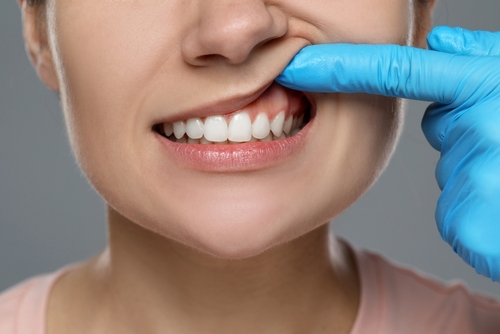An Effective Solution for Gum Disease
Gum disease, also known as periodontal disease, affects the tissues surrounding your teeth and can lead to tooth loss if left untreated. While regular cleanings and good oral hygiene can help prevent gum disease, more advanced cases may require specialized treatment. One such treatment option is antibiotic therapy. Our skilled dentist in Tuckerton, NJ, Dr. Ronald Petrosky offers this solution to patients in Tuckerton, Little Egg Harbor, Barnegat, Manahawkin, Beach Haven and the surrounding communities.
To learn more about how antibiotics can help treat gum disease and what to expect, contact our Tuckerton dental office by calling (609) 296-1007.
What Is Antibiotic Therapy for Gum Disease?
Antibiotic therapy for gum disease involves using medication to kill or control the bacteria that cause infections in the gums. These antibiotics can be used as a stand-alone treatment in some cases or in combination with other dental treatments like scaling and root planing (deep cleaning). Antibiotics can be especially helpful in treating more severe forms of gum disease, where bacteria have deeply invaded the gum tissues.
Types of Antibiotics Used for Gum Disease

- Topical Antibiotics: These antibiotics are applied directly to the infected gum tissues. Examples include antibiotic gels, rinses, or powders, such as doxycycline gel or chlorhexidine mouthwash. These are often used in milder cases or following a deep cleaning.
- Oral Antibiotics: Taken in pill form, oral antibiotics, such as amoxicillin or metronidazole, treat bacterial infections throughout your body and are often prescribed for more serious gum infections.
- Antibiotic Chips or Strips: These small strips or chips contain antibiotics and are placed directly into deep gum pockets to release medication over time, treating localized areas of infection.
Benefits of Antibiotic Therapy
Antibiotics can play an essential role in the treatment of gum disease, especially in its advanced stages. Some benefits include:
- Targeted Treatment: Antibiotics can effectively target and eliminate the harmful bacteria that cause gum infections.
- Non-Invasive Option: In many cases, antibiotic therapy is less invasive than surgical treatments, making it an attractive first option for managing periodontal disease.
- Enhanced Healing: Antibiotics help control the infection, allowing your gums to heal and reducing inflammation.
- Prevention of Further Damage: By controlling the bacterial infection, antibiotics can help prevent the progression of gum disease and the associated risk of tooth loss.
How Antibiotic Treatment for Gum Disease Works
When you visit Tuckerton Dental, Dr. Petrosky will assess the severity of your gum disease to determine if antibiotics are necessary. If prescribed, antibiotics work by killing or limiting the growth of bacteria in your gums. Depending on your specific needs, Dr. Petrosky may recommend either topical or oral antibiotics, or a combination of both.
Antibiotics are typically used in conjunction with other treatments such as scaling and root planing, a procedure that removes plaque and tartar from below the gumline. Antibiotics help by reducing bacteria levels and inflammation, speeding up your recovery and preventing further infection.
Alternatives to Antibiotic Therapy
While antibiotics are an effective option for treating gum disease, they are not always necessary or the only treatment available. Alternatives include:
- Scaling and Root Planing: A deep cleaning procedure that helps remove plaque and tartar from below the gumline, allowing the gums to heal naturally.
- Laser Therapy: This minimally invasive option uses laser technology to remove infected tissue and bacteria, promoting healing in the gums.
- Surgical Options: In advanced cases of gum disease, surgical procedures such as gum grafts or pocket reduction surgery may be required to restore healthy gums.
Costs of Antibiotics for Gum Disease Treatment
The cost of antibiotic therapy for gum disease will depend on several factors, including the type of antibiotic prescribed and the severity of your condition. Generally, topical antibiotics may cost less than oral antibiotics, and the cost will vary depending on whether you need additional treatments like scaling and root planing.
Dr. Petrosky is dedicated to providing affordable care to their patients and can help you explore different treatment options that fit your budget. We serve patients in Tuckerton, Little Egg Harbor, Barnegat, Manahawkin, Beach Haven and the surrounding areas.
Frequently Asked Questions
The time it takes for antibiotics to work in treating gum disease varies depending on the severity of the infection and the type of antibiotic used. However, in most cases, patients can expect to see improvement in their gum disease symptoms within a few days to a week of starting antibiotics. It’s important to follow the full course of treatment prescribed by your dentist or healthcare provider, even if symptoms improve quickly.
Common side effects of antibiotics used in gum disease treatment may include upset stomach, diarrhea, and yeast infections. Some antibiotics may also cause allergic reactions, such as hives or difficulty breathing. It’s important to discuss any concerns about side effects with your dentist or healthcare provider before starting treatment.
Antibiotics are often used in combination with other therapies, such as deep cleaning procedures like scaling and root planing, to treat gum disease. While antibiotics can be effective in reducing the bacterial infection that causes gum disease, they may not address other underlying factors contributing to the condition, such as poor oral hygiene or smoking.
Long-term use of antibiotics to treat gum disease can increase the risk of developing antibiotic resistance, which can make future infections more difficult to treat. It’s important to use antibiotics only when necessary and as directed by your dentist or healthcare provider. Your dentist may also recommend periodic assessments to monitor your gum disease and adjust your treatment plan as needed.
Get Help for Gum Disease Today
Antibiotics can be a game-changer when it comes to managing gum disease. Whether used alone or in combination with other treatments, they can help control harmful bacteria, reduce inflammation, and prevent the progression of the disease. If you’re experiencing symptoms of gum disease, such as swollen or bleeding gums, don’t wait—schedule a consultation with Dr. Petrosky at Tuckerton Dental by calling (609) 296-1007.